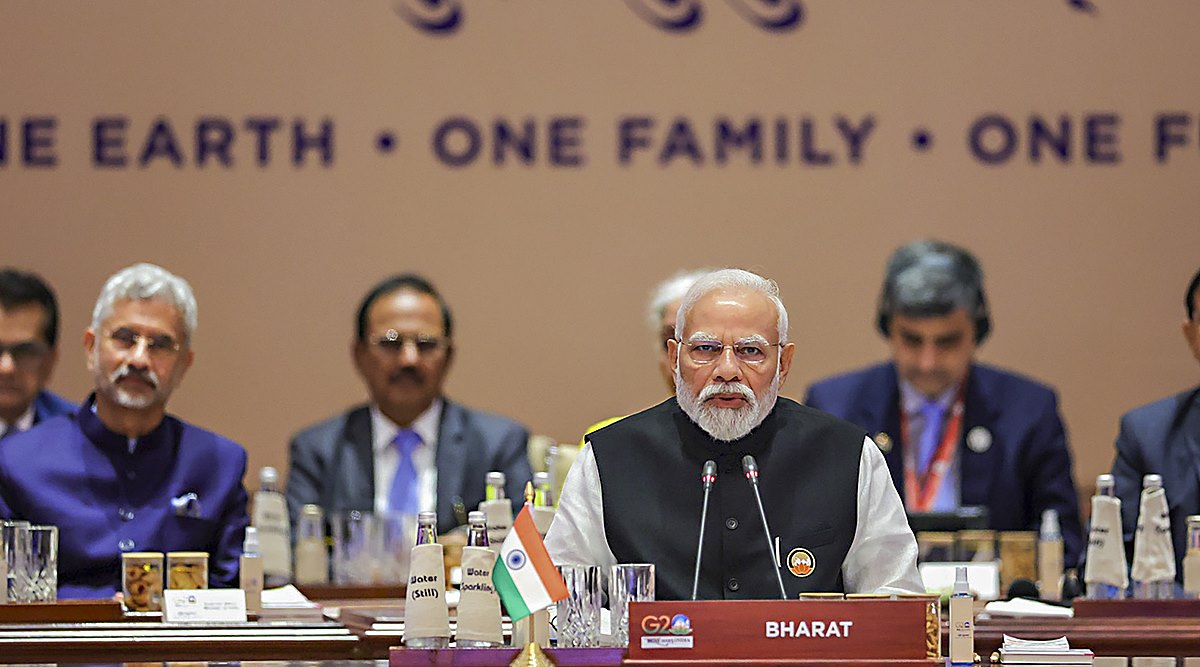Addressing the closing session of the G20 Summit, PM Modi proposed holding a virtual session at the end of November to take stock of the progress made on the suggestions in New Delhi.

Handing over the gavel of the Presidency to Brazil President, Modi said, “We have full faith in the Troika spirit. We will provide our full support to Brazil and are confident that under their leadership, the G-20 will further our shared goals.”
“As you all know, India has the responsibility of G-20 Presidency till November. There are still two and a half months left. In these two days, all of you have put forth many things, given suggestions, made many proposals. It is our responsibility to look at the suggestions that have come forward to see how our progress can be accelerated. I propose that we hold another virtual session of the G-20 Summit at the end of November,” Modi said.
“In that session we can review the topics decided during this summit. Our team will share the details of all these with you all,” he said before declaring the conclusion of the G-20 Summit.
He ended his closing remarks with a Sanskrit phrase—Swasti Astu Vishwasya! (There should be hope and peace in the entire world.)
Earlier in the day, Modi addressed the third session of the G20 Summit and suggested a framework for responsible Human-Centric AI.
Story continues below this ad
“Today, we are witnessing unimaginable scale and speed in new generation technology. The example of Artificial Intelligence is in front of us. In 2019, the G20 adopted ‘Principles on AI’. Today we need to go one step further,” Modi said.
“I suggest that we now create a framework for Responsible Human-centric AI governance. India will also give its suggestions in this regard. It will be our endeavour that all countries get the benefits of AI in areas like Socio-Economic Development, Global Workforce and R&D,” he said.
Speaking about the vision, Modi said, “I have continuously drawn your attention to the Human Centric Vision instead of the GDP Centric Approach. Today, many countries like India have so much, which we are sharing with the whole world. India has used the data of the Chandrayaan Mission in the interest of humanity. We have talked about sharing it with everyone. This is also a proof of our commitment towards Human Centric Growth”.
“India has used technology for inclusive development and last-mile delivery. In our smallest villages, even the smallest merchants are making digital payments. I am glad that under India’s chairmanship, a strong framework for Digital Public Infrastructure has been agreed upon. Similarly, the ‘G20 Principles on Harnessing Data for Development’ has also been accepted,” the PM said.
Story continues below this ad
The Prime Minister said it has also been decided to launch the “Data for Development Capacity Building Initiative” for the development of Global South. Formation of the Startup 20 engagement group during the Presidency of India is also a big step, he said.
The Prime Minister also flagged the need for the development of global standards for regulating crypto-currencies.
“Today, our world is also facing some other burning problems, which are affecting both the present and future of all our countries. We are familiar with the challenges of cyber security and crypto-currency. The field of crypto-currency, social order, and monetary and financial stability has emerged as a new topic for everyone. Therefore, we have to develop global standards to regulate crypto-currencies. We have the Basel standards on bank regulation in front of us as a model,” he said.
“There is a need to take concrete steps in this direction as soon as possible. Similarly, global cooperation and framework are also needed for cyber security. Terrorism is getting new mediums and new methods of funding from the cyber world. This is a very important subject for the security and prosperity of every country,” he said.
Story continues below this ad
“Only when we take care of the security of every country and the sensitivity of every country, will the feeling of One Future be strengthened,” he added.
Modi also stressed the need for reforms in global institutions.
“To take the world towards a better future, it is necessary that the global systems should be according to the present realities. Today, the United Nations Security Council is also an example of this… At that time there were 51 founding members in the UN. Today the number of countries included in the UN is around 200,” Modi said.
“Despite this, the number of permanent members in the UNSC is still the same. Since then, the world has changed a lot in every aspect. Be it transport, communication, health, or education, every sector has been transformed. These new realities are part of our new global. This should be reflected in the structure,” he said.
Story continues below this ad
“It is a law of nature that the person and organisation which does not change with time loses its relevance. We have to think with an open mind as to what is the reason that many regional forums have come into existence in the past years, and they are also proving to be effective,” he added.
Modi said that it is necessary for every global organisation to reform to increase its relevance today.
“With this in mind, yesterday we took the historic initiative of making the African Union a permanent member of the G-20. Similarly, we also need to expand the mandate of Multilateral Development Banks. Our decisions in this direction should be immediate and also effective,” he said.
“In a rapidly changing world, we need sustainability and stability along with transformation. Come! Let us pledge that we will take our resolutions of the Green Development Pact, Action Plan on SDGs, High-level Principles on Anti-corruption, Digital Public Infrastructure, and MDB Reforms to fruition,” he said.









